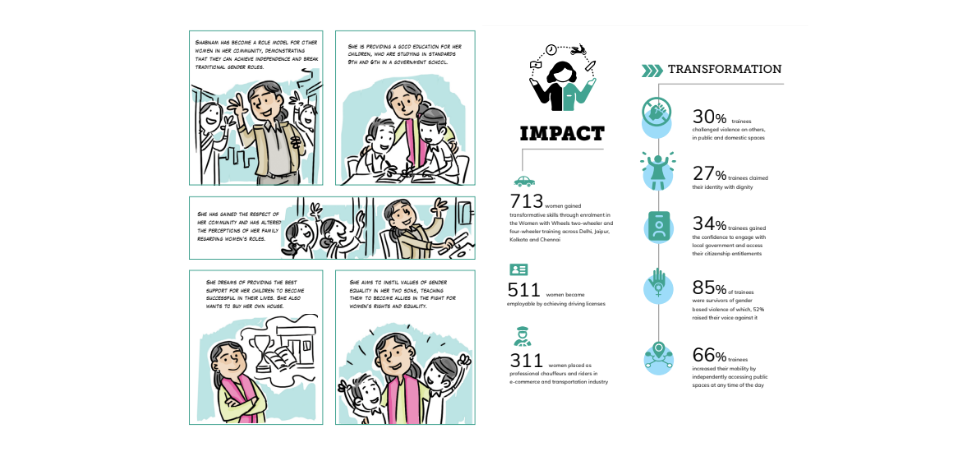Dear Friends,
We are living in a world engulfed in polycrisis. As we write this note from a city in India, many other parts of the world are witnessing conflict and human rights violations against civilians, including women, children, and the elderly. The entire world is suffering from the consequences of mindless exploitation of the environment in the form of extreme weather patterns due to global warming, which is negatively impacting our overall well-being. Carbon emissions have increased from 0.8% to 1.5% in 2022. India’s emissions grew at slightly more than 7% (CO2 Emissions in 2023 Report, IEA). Economic growth favoring some over others worldwide has exacerbated inequality, with marginalized people bearing the brunt. In India, economic inequality and access to resources are further compounded by the hierarchies of caste, gender, region, and religion. The rich have become richer, and the poor have become poorer, with the top 10% of the Indian population holding 77% of the total national wealth (Oxfam India).
Top-down economic policies have left common people, particularly marginalized women, with limited choices. Although female enrollment in higher education has significantly increased in India, the percentage of early marriage remains concerning, with 23% of women aged 20-24 having been married before the age of 18 (NFHS-5). Access to skill education continues to be gendered, contributing to the low workforce participation of women. Women’s labor force participation increased from 23% in 2017-18 to 37% in 2022-23, yet it remains much below the global average of 50% (PLFS, World Bank). The increase is also mainly due to women’s labor in family enterprises and small businesses in rural areas, even though women often lack access and control over their personal earnings, as their income is mostly included within the family’s collective income (Ashwini Deshpande, 2023). In 2022-23, 36.1% of men and 18.6% of women aged 18-59 received vocational training. Despite 17% of ITIs being women-only, only 7% of skill trainees were women candidates in 2021 (IndiaSpend). Women and girls’ access to opportunities is further exacerbated by the rising gender-based violence against them. An NCRB report reveals shocking figures of 87% rise in crimes against women over 10 years between 2011 and 2021.
While these realities persist, Azad Foundation believes in a system change approach through its GJSE framework. We look at the entire ecosystem of change that needs to be established to enable marginalized women to access transformative skill education for meaningful employment in non-traditional livelihoods (NTL), economic and social empowerment, and a life of dignity. This gender-just ecosystem is created through a network of community change agents. In 2023-24, 416 young women and men change agents shared information to combat gender-based violence and provided support to access NTL to 5.8 lakh women and men. Men’s perceptions about sharing unpaid care work positively changed from 43% to 61%. 511 women were supported in obtaining driving licenses through transformative capacity-building training. Azad continued training women to drive electric vehicles, and Sakha subsequently placed around 50 of these women in the green transportation market in 2023-24. Additionally, as a result of Azad’s policy engagement with the Delhi Transport Corporation, 93 women are now driving buses. All of them are receiving training for operating electric buses, with a few already driving electric buses. This initiative aimed to empower women through new technology and promote environment-friendly transportation solutions.
In order to ensure women’s sustenance in employment, Azad promotes gender inclusion in the larger ecosystem of policies, infrastructure, and market. This year, an impact assessment study on Azad’s work for over a decade (2008-2022) was conducted by Ambedkar University. It aimed to serve as a body of knowledge for scaling up and mainstreaming the inclusion of women in non-traditional skilling and workforce. The study found that Azad’s feminist approach in training and skill development empowers women to not just pursue careers in driving but reshape their lives and forge new identities. They empower themselves to navigate and assert control over the city, strengthening their rights as citizens.
Azad has always believed in alliance building and continued to work as the secretariat of the NTL Network for Women, a national-level network that promotes NTL for women. Along with this, Azad formed collaborations with many other organizations throughout the year. From campaigns to sharing learning journeys and holding the Kamla Bhasin Awards for Driving Gender Equality across South Asia, Azad demonstrated collaboration and inclusivity as core values of its work. The Kamla Bhasin Awards, instituted with two partner organizations, expanded its outreach and visibility of women practitioners of NTL and men working to create alternative masculinities across the South Asian region.
Last year, while the whole world was suffering from multiple catastrophes—from geopolitical violence to a broken economy to the scarcity of services—collective efforts and strategic partnerships helped us stay the course, enabling us to overcome challenges on the way. The Azad team tried its best to support women from marginalized communities in India to earn their livelihoods in non-traditional professions and live with dignity and distinct identities. We commend the indomitable spirit of the women trainees, community change agents, and women drivers who became our pillars of strength. This was also made possible by the hard work of the Azad team, Azad’s partners, and the unwavering and generous support of its board.
As we look to the future, we remain hopeful and committed to fostering a world where women can access their rights and resources, live violence-free lives, and thrive in dignified livelihoods.
Let’s turn the pages to see how we worked towards achieving our mission in 2023-2024!
With love and solidarity,
Dolon and Shrinivas
